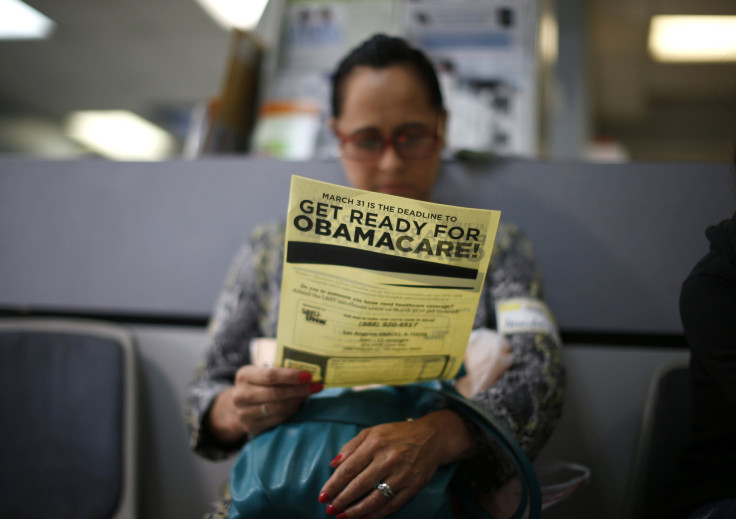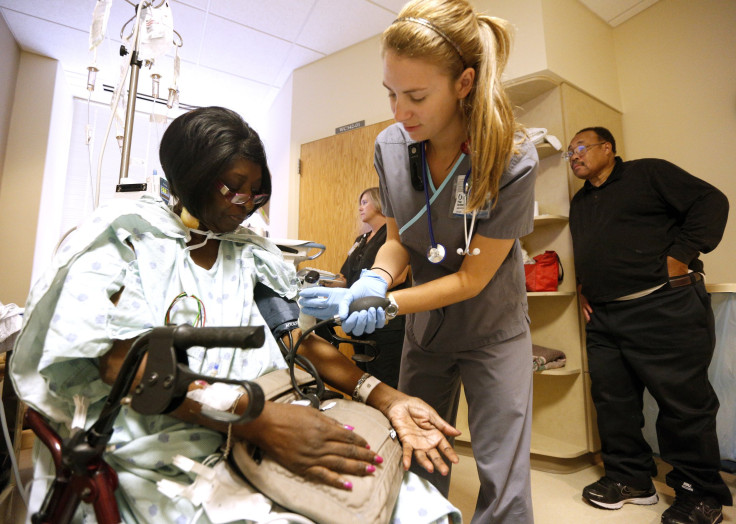Obamacare Problems: The Affordable Care Act Has A Coverage Gap Because Of State Lawmakers

Donna Bell wants more than anything to be a mother, but without health insurance, that's impossible. After miscarrying her first pregnancy in 2010, Bell was diagnosed with uterine fibroids, benign tumors that require surgery before she can attempt to have children. Without health insurance, she can't pay for the operation.
Bell, a licensed massage therapist in Houston doesn't have health insurance because her state government chose not to expand its Medicaid coverage. She's one of 2.6 million people who fall into a coverage gap under the Obama administration's landmark Affordable Care Act because of local lawmakers' policy decisions.
"I am out of luck," Bell told International Business Times. "I have to come out of pocket to pay for it and I just don't have the money."
The debate over Obamacare's rising premiums rages has hung over the 2016 presidential election, but millions of Americans like Bell never received coverage in the first place. Thanks to a coverage gap that opened up after the Supreme Court ruled that states couldn’t be mandated to expand their Medicaid programs, some Americans are now floundering in a middle ground with incomes too low for marketplace coverage but too high for Medicaid.
The expansion of Medicaid was a core tenet of Obamacare, aimed at addressing high rates of uninsurance among low-income adults. The plan raised the income necessary to qualify for Medicaid from $8,870 a year to $27,821 a year for a family of three to encompass a broader swath of people. The act also expanded some provisions to include coverage for adults without children, as Medicaid has typically only covered families with children in the past.
Medicaid was on its way to nationwide expansion when, in 2012, 26 states challenged the constitutionality of Obamacare in a case that made its way to the Supreme Court. The Court ruled that obligating states to expand Medicaid was “unconstitutionally coercive” and left it up to the states themselves to decide whether or not they wanted to broaden their plans. Ultimately, 19 states have now chosen not to expand their Medicaid coverage.
“You have a very ideologically based resistance coming from more tea party-leaning Republicans that want to just say no to Obamacare, and Medicaid expansion falls under that hat,” said Jean Alker, a research professor at Georgetown University’s McCourt School of Public Policy in Washington, D.C., who has studied Medicaid extensively.
More people than ever before have health insurance because of the Affordable Care Act. An estimated 20 million additional people received coverage under the health care overhaul, according to the latest numbers published by the Department of Health and Human Services in March. Roughly 90 percent of the people in the coverage gap live in the South, with a quarter in Texas alone.
Bell has no children and under Texas' restricted Medicaid program, which means she doesn’t qualify for help with the care she so desperately needs.
“I have an extremely large fibroid that’s pushing against my other internal organs, and I can’t afford to have that surgery," said Bell.
Most uninsured Americans in the coverage gap who are employed work part-time or for small companies and don’t receive any coverage through their employers. Those who are eligible for insurance in the health-care marketplace, like Bell, often find the costs far too expensive.
“I want for women without children to be acknowledged,” said Bell. “I basically feel like I’m being punished for being a working woman.”
Half of those in the coverage gap reported that their health is excellent or very good, according to a Kaiser Family Foundation study released in October. While healthy people don’t require as much costly medication as those who are sick, covering healthy patients produces social and economic benefits in the long run by increasing their quality of life and minimizing the risk of costly illness, studies show.
“What these folks are missing is access to primary, preventative care,” explained Alker. “That means their conditions will worsen and become more expensive to treat.”

There’s no deadline for states to expand their Medicaid coverage and they can choose to do so at any time. But in many ways, the fate of Obamacare and the uninsured and insured alike depends on who wins the upcoming election. Republican nominee Donald Trump has pledged to repeal and replace the Affordable Care Act. He’s also said he’ll review Medicaid’s options and work with states to ensure that low-income Americans have access to healthcare and that “no one slips through the cracks simply because they cannot afford healthcare.” Democratic nominee Hillary Clinton has vowed to defend and expand Obamacare and promised to incentivize states to expand Medicaid and make enrollment into the program easier.
“I think once we get past the election, some of this intense partisanship around Obamacare will become to fade,” Alker predicted. “We’ll see more states begin to take a serious look at this option.”
In the meantime, the uninsured like Bell are out of options.
“On a good day, I feel like less of a woman. I’ve been told that my chances for reproduction are high risk or even slim to none,” said Bell. “That eats away at me, mentally. As a woman, I feel it’s part of who I am. I should be someone’s mom.”
© Copyright IBTimes 2025. All rights reserved.






















